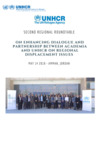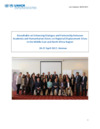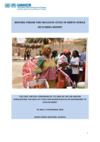16 Days Against Violence: UNHCR deeply disturbed by scale of violence against women
In 2012, some 12,000 incidents of sexual and gender-based violence were reported to UNHCR around the world, but many more cases never come forward.

Syrian refugee children attend a class in the Bekaa Valley, Lebanon. UNHCR chief António Guterres says humanitarian crises, like the conflict in Syria and Typhoon Haiyan in the Philippines, disproportionately affect children and adolescents and make them vulnerable. © UNHCR/S.Baldwin
GENEVA, November 25 (UNHCR) - UN High Commissioner for Refugees António Guterres said on Monday that the scale of sexual and gender-based violence was "deeply disturbing" despite the efforts of UNHCR and its partners to counter the "heinous" human rights abuse.
"In 2012, some 12,000 incidents were reported to UNHCR, but many more cases never come forward," Guterres said in a message to staff to mark the start of the annual 16 Days of Activism against Sexual and Gender-Based Violence.
He said that under this year's theme, "Safety in School," UNHCR aims to bring together boys and girls, teachers, parents, communities and partners to find durable and community-based solutions to prevent sexual and gender-based violence (SGBV) in school.
Guterres noted that humanitarian crises, like the conflict in Syria and Typhoon Haiyan in the Philippines, disproportionately affect children and adolescents. "Loss of family members, homes and ultimately futures, but also pre-existing gender inequalities and disruption of protective systems make boys, girls and youth extremely vulnerable to sexual and gender-based violence," he stressed.
The High Commissioner added that an estimated 60 million girls around the world are sexually assaulted on their way to school every year. Many boys and girls also face such violence in their classrooms and playgrounds. "This heinous human rights violation also carries significant human, social, and economic costs to our societies," he said.
"Recognizing the multi-faceted risks of SGBV that children and adolescents face, and the protective role education can play, UNHCR has focused in 2013 on integrating its strategies in the three core protection areas of SGBV, child protection and education," he explained. "Many operations are already developing mutually reinforcing programmes to protect girls and boys of concern from SGBV in school settings."
Guterres pledged that UNHCR, working closely with local partners and national authorities, would scale-up efforts to ensure safe learning environments, including through parent-teacher associations, youth clubs, extracurricular activities, the enforcement of codes of conduct, and confidential referral mechanisms for students to access health and psychosocial services.
"We know that by adopting a gender-sensitive approach to multisectoral services, for example by building separate latrines in schools or promoting the recruitment of female teachers among other measures, we can make girls and boys safer in school," he said.
Guterres noted that 148 UNHCR offices were implementing SGBV prevention and response programmes this year, making SGBV one of the highest selected objectives in country plans. But he added that safe learning environments "remain an under-programmed area in UNHCR operations."
UNHCR offices across the world, including the refugee agency's headquarters in Geneva, are holding events to mark the 16 Days of Activism and today's International Day to Eliminate Violence Against Women. For example, in addition to organizing cultural activities such as dancing, the UNHCR team in Burundi has also launched SGBV-related quizzes in schools as well as performances by teachers and students. Their objective is to focus on youth in order to help them understand how to prevent SGBV in schools, how to change behaviour in the long term to be more respectful of girls and women.
The 16 Days of Activism is an international campaign originating from the first Women's Global Leadership Institute in 1991. The 16 Days of Activism will run through to International Human Rights Day on December 10. It brings together UNHCR, partners, persons of concern and host communities worldwide in a united call to end sexual and gender-based violence in all its forms.
-

Regional Roundtable on the Role of Faith-Based Organizations in Addressing Displacement in MENA
7 Dec 2021 The purpose of the meeting was to explore the role of religion in promoting universal understanding and respect of human dignity, and faith-based responsibility towards displaced people and refugees. The main goal of the roundtable was to formulate commitments or pledges from religious actors in the region to refugees at a time of heightened tensions in some places towards the GRF. -

Second Regional Roundtable On Enhancing Dialogue and Partnership Between Academia and UNHCR on Regional Displacement Issues
7 Dec 2021 The second regional academia roundtable, co-hosted by UNHCR, the WANA Institute and the Columbia Global Center | Amman saw the participation of over 40 participants from various think tanks, academic institutions and research centers from across the MENA region. This gathering provided a platform for academia to frame its role in influencing policy, programs and discourse related to displacement in the MENA region in the context of major global processes including the Global Compact on Refugees (GCR) and the Comprehensive Refugee Response Framework (CRRF). -

Roundtable on Enhancing Dialogue and Partnership between Academia and Humanitarian Actors on Regional Displacement Crises in the Middle East and North Africa Region
7 Dec 2021 Organized by the UNHCR MENA Policy Unit, in partnership with the West Asia-North Africa (WANA) Institute, the first of its kind regional roundtable for academia brought together academics, think tanks, research centers, and university professors from 12 countries to discuss their role in humanitarian interventions. The discussions brought to light challenges that academia faces, and generated concrete suggestions and good practices in relation to solutions. -

The First MENA Roundtable on the Role of Art and Culture in Addressing Displacement
7 Dec 2021 The roundtable was the first of its kind in the region and aimed to discuss how artists and cultural actors can shape public narratives and expand the space for constructive dialogues, particularly in relation to social cohesion between refugees and host communities. The roundtable provided a platform for over 50 artists and cultural actors to frame their role in issues related to displacement in MENA and share successful practices of promoting refugee inclusion. -

Mayors Forum for Inclusive Cities in North Africa Outcomes Report
7 Dec 2021 The Mayor's Forum for Inclusive Cities in North Africa brought together mayors, municipality authorities and civil society organisation representatives from major refugee hosting cities in Egypt, Morocco, Algeria, Libya, Tunisia and Mauritania. The forum was hosted by UNHCR under the supervision of the Mayor of Tunis and aimed to build a common platform of good practices and learning among cities and with UNHCR, on the challenges and opportunities facing sustainable policy design and operational for inclusive cities. -
Briefing to the United Nations Security Council
7 Dec 2021 -

Evaluation of UNHCR's engagement in humanitarian-development cooperation Sep 2021
7 Dec 2021 This report contains the findings of an evaluation of UNHCR's engagement in humanitarian-development cooperation (Sep 2018 - March 2021). The evaluation was commissioned by UNHCR due to recent high-level policy developments and initiatives, such as the 2016 Global Compact on Refugees, in order to support a more comprehensive response to displacement, involving both humanitarian and development actors. Attachments: Executive Summary, Management Response and Annexes (.zip) -

Age Gender and Diversity Tip sheet - Helping to ensure AGD inclusive pledges and good practices for the GRF (ENG, 2021)
6 Dec 2021 This Tip Sheet builds on the progress made at the 2019 Global Refugee Forum (GRF) to help ensure pledges address gaps related to age, gender, and diversity (AGD), including disability, in refugee responses. -

Anna Drijver
Anna Drijver has been supporting UNHCR since 2018.
